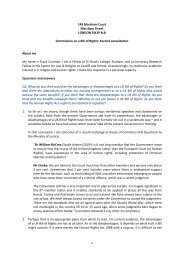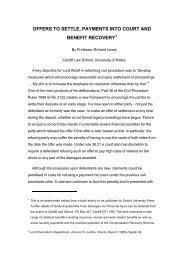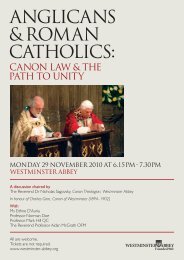Constitutional patriotism - Cardiff Law School
Constitutional patriotism - Cardiff Law School
Constitutional patriotism - Cardiff Law School
You also want an ePaper? Increase the reach of your titles
YUMPU automatically turns print PDFs into web optimized ePapers that Google loves.
ANU E-PressDr Vito Breda<strong>Constitutional</strong> Patriotism & Identity<strong>Constitutional</strong> <strong>patriotism</strong> cuts across two different debates. The first debate concernsfinding the right balance between the power given to individuals (to alter their inheritedconstitution) and the concerns that such a power might create. 35 In relation to this debate,constitutional <strong>patriotism</strong> deems radical democracy to be the best method for settingconstitutional norms. The second debate concerns the element(s) of a constitution systemthat citizens might perceive as 'worth fighting for'. 36Habermas questions the plausibility of the nation-state as a believable object of attachment.He argues that the plausibility of the nation-state as a default answer to the constitutionalintegration dilemma is dependent on a balanced equilibrium between integration with anational identity and the protection of individual freedom. If the relationship between thetwo is not well adjusted, it might hinder the democratic stability of the constitutional polity.Habermas notes, for instance, that national identity and rights have to be perceived in ahierarchical relation: 'This ambivalence [the partnership between state and nation] remainsharmless as long as a cosmopolitan understanding of the nation of citizens is accordedpriority over an ethnocentric interpretation of the nation as [being] in a permanent state ofwar'. 37 The term 'war' might be too evocative here (this language is perhaps borrowed fromSchmitt), but the reference to a potential conflict between national identity and aliens is aserious concerns in a European state with limited control over internal common marketmass immigrations.Habermas notes that the key difficulty concerning the framework of the nation-state goesbeyond the pragmatic risk of accepting the nation as a model of social integration. Theframework of the nation-state assumes a partnership between two systems of values.Popular national self-consciousness provided the cultural background against which'subjects' could become politically active 'citizens'. Belonging to the nationalcommunity made possible, for the first time, a relation of solidarity between personswho had previously been strangers to one another. Thus the achievement of thenation-state consisted in solving two problems at once: it made possible a new modeof legitimation based on a new more abstract form of social integration. 38On the one hand, a polity needs a system of state institutions. Legitimate state institutionsare a factual necessity of any large group of individuals that seeks to pursue a commonenlightened project. On the other hand, the nation is a concept that expresses the right of35 Joshua Cohen, 'Deliberation and Democracy' in William Rehg (ed), Deliberative Democracy : Essays onReason and Politics (1997) 35, 39036 Jan-Werner Müller, <strong>Constitutional</strong> Patriotism (2007)4737 J. Habermas, 'Citizenship and National Identity: Some Reflections on the Future of Europe' (1992) 12(1)Praxis international 1, 238Jürgen Habermas, 'The European Nation State: On the Past and Future of Sovereignty and Citizenship' inJürgen Habermas, Ciaran Cronin and Pablo De Greiff (eds), The Inclusion of the Other : Studies in PoliticalTheory (1999):105 11111 | P a g e
















